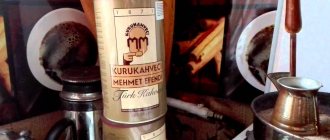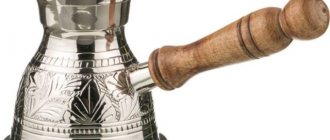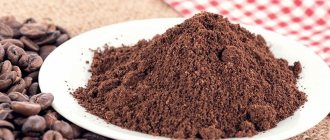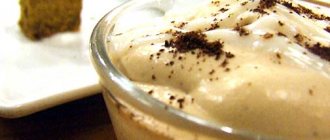Reviews (2)
9
Prepared by: Ekaterina Matsulina
07/23/2016 Cooking time: 30 min
| Save | I cooked) | Estimate |
If you prefer to drink strong coffee, then the option of making Turkish coffee is what you need. Plunge into this fascinating process of its preparation, breathe in its aroma!
Does coffee grow in Turkey?
The Republic of Turkey is not among the countries that grow coffee trees. Nevertheless, this drink (along with tea) is so popular in the country that it is considered part of the national culture, an indispensable attribute of special events, business meetings and family feasts.
Local supply companies offer a wide selection of different types of drink.
The first place is occupied by Turkish coffee beans, which are brewed in a traditional cezve with the addition of:
- cognac;
- nuts;
- spices;
- honey;
- fruit juice.
The drink first appeared in the Ottoman Empire in the 16th century.
There are different versions about this event:
- The fruits of the coffee tree were brought to Turkey by Syrian travelers.
- The drink was first served to Suleiman the Magnificent, who paid a visit to Yemen, which at that time was part of the huge Ottoman state.
In the first years after its appearance in the country, coffee was considered a privilege of the nobility. Later, the “invigorating elixir” began to spread throughout society, winning the love of the local population.
The Turkish climate is not entirely suitable for growing coffee trees. Historically, raw materials were imported from Arab countries. Now coffee beans are an important import item for the country. The Republic of Turkey has entered into agreements for the supply of raw materials with many global manufacturers.
What is important to know about making Turkish coffee in Turkish
For many people in Turkey, making coffee is not only a daily ritual, but also a good way to celebrate friendship and express gratitude to those you love.
The first thing guests in Turkey are asked is not whether you would like to drink Turkish coffee, but how would you like it prepared for you? Only then will the host ask about the amount of sugar you want in your coffee. You can answer with:
- "sade" means no sugar.
- “az seker” - a little sugar.
- “orta” - with 1-2 teaspoons of sugar.
- “sekerli” - with 3-4 teaspoons of sugar.
The person who will brew the coffee is then responsible for preparing it according to the guest's individual preferences. Usually this person is the youngest girl in the house.
What types of coffee are there in Turkey?
Coffee products in Turkey can be found in every supermarket. In all cities of the country there are stores specializing in the sale of this product.
The main rule for preparing real Turkish coffee is to use Arabica beans, finely ground and moderately roasted. Coffee can be bought in Turkey almost on every corner: in small shops, large supermarkets and in specialized shops. On the shelves there are options from the strongest to caffeine-free mixtures, as well as with various flavoring additives.
Turks also pay attention to other types of coffee:
- Soluble . It is represented by a variety of brands, the most popular of which are “Jacobs” and “Nescafe”. The drink made from such raw materials is not strong. Many people call it “female” or “childish”.
- Ground coffee almost ready for brewing. The grains do not need to be crushed; it is enough to prepare the drink in a traditional cezve.
- Ottoman coffee stands out in a separate group. When brewing a hot drink, milk, sugar, and aromatic spices are added.
Be sure to read: Powdered Turkish tea: what varieties are there, composition, how to brew, preparation features
The birthplace of the coffee tree and the history of the origin of the drink
The birthplace of coffee is the African continent. Arabica (Arabian coffee tree) was found in the fourteenth century in the largest country in Africa - Ethiopia. Robusta (Congolese coffee tree) was discovered much later, in the nineteenth century in the Congo River basin. Although, according to legends, he was known long before that.
Arabica tree in the wild of Ethiopia
The history of coffee began with simply drying coffee fruits in the sun and brewing their peels as tea.
. Also, a heady drink reminiscent of wine was prepared from fresh grains by fermentation. It was used mainly by the poor population. By the fifteenth century, thanks to travelers, this product began to spread throughout the eastern countries, and later came to Europe.
Over time, coffee preparation has improved, and technologies for roasting, grinding beans and brewing have been developed. After this, rich and noble people drew attention to the unusual, invigorating drink. In the sixteenth century, mass consumption of the drink began. This happened thanks to Turkish merchants who began to open the first coffee shops, first in Constantinople, and then throughout the country. Very quickly, this fashion trend spread throughout the Middle East and Europe.
Soon such establishments began to enjoy enormous popularity. It was convenient to communicate with friends and acquaintances over a cup of aromatic drink. Initially, the “cream of society” gathered here. Over time, they began to be visited by all segments of the population. For the convenience of visitors and to generate more income, coffee shops began to be combined with confectionery shops. The basic technology for making coffee, which was used in the first Turkish coffee shops, has remained unchanged to this day, where the modern vision of the drink came from.
Origin of the word coffee
There is no clear answer to this question. But it is believed that the word “coffee” comes from a province in southern Ethiopia called Kaffa, where Arabica was first found. In it you can still find wild Arabian coffee trees that grow in large tracts.
Translated from Arabic, the word sounds like “kahve” and means “drink.” In another version it is translated as “wine”.
Turkish coffee: popular brands
The country's climate is not suitable for growing coffee plants. Despite this, there is a wide range of coffee on supermarket shelves. There are various types on sale, but coffee beans remain the favorite.
| brand | description |
| Kurukahveci Mehmet Efendi | The company began operating in the 19th century. Now the factories use the latest developments and technologies. Many years of production experience are also taken into account. Mehmet Efendi produces products from finely ground beans, which produce strong aromatic coffee. A package weighing 100 g will cost 5-6 liras (or 55-65 rubles). |
| Hisar Kahve 1928 | The corporation, founded in the first half of the 20th century, produces coffee products using modern equipment. The use of the latest technological developments in production, combined with the experience accumulated over a century of operation of the company, helps to produce high-quality products. The price of the product (per 100 g) is 5-7 liras. This is 55-78 rubles. |
| Cezbeli Kahve | The company is based in Istanbul. Produces instant coffee. Selected Arabica beans are used for production. A package weighing 100 g costs 5 liras (55-58 Russian rubles). |
| Kahve Dunya Türk Kahvesi | A manufacturer operating in the Turkish coffee market since 2004. It supplies ground and instant coffee to stores across the country, and also exports goods to foreign countries (Kuwait, Saudi Arabia, Romania). 100 g of raw materials costs from 5 to 7 liras (from 55 to 78 rubles). |
| Ulker Cafe Grown | The Ülker company, traditionally engaged in the production of chocolate products, produces different types of instant coffee:
The cost is 50 kurus per bag (portioned). Translated into Russian money, this is 5-6 rubles. |
| Nurettin Kocatepe Türk Kahvesi | The Kocatepe company began operations in 1948. The company produces coffee beans. The raw materials are characterized by a high degree of roasting. However, this does not affect the taste of the finished drink, which remains soft, without the slightest sign of bitterness. 100 g of raw materials costs 6-7 Turkish liras (66-78 rubles). |
General recommendations
When brewing oriental coffee, you need to adhere to the following recommendations:
- Strictly follow the grinding technology.
- If the beans overheat, the taste of the drink will be spoiled.
- Store coffee in a dry, airtight container.
- The jar should be rinsed after each wash. It is unacceptable to have detergent residues on the dishes.
- Pour coffee powder into the pot with a dry and clean spoon.
- Brew the drink immediately before serving. Over time, it loses its rich aroma and taste.
- After roasting, the grain can be stored for a maximum of a couple of weeks.
- Do not allow the liquid to boil. Turku is set aside immediately after the foam appears.
Turkish coffee beans: which one is better?
Turkish manufacturing enterprises supply the local market with a wide range of products containing Robusta or Arabica beans. Arabica is in greatest demand in Turkey. It is believed that a drink made from Arabica beans tastes better and also has a brighter aroma.
When purchasing products, you need to pay attention to the labels on the packaging. The percentage of raw material quality (100% Arabica) must be indicated there. According to the Turks, only from such a product can a real aromatic “elixir” be prepared.
The country of origin of the grains is also important. Products grown in Brazil are in demand. In addition, such products have a relatively low cost.
A little history of the recipe
They have been drinking coffee in Turkey since 1543 – it was then that the beans were brought into the country, from which this amazing drink is still brewed to this day. A year later, the first coffee shop appeared in the Ottoman Empire, where people spent time having pleasant conversations, enjoying the aroma of an invigorating drink. From that moment on, the culture of coffee consumption was born, and the famous recipe spread throughout the world.
Thanks to the Turkish people, people learned a lot about the preparation of an invigorating drink, its healing properties and the rituals associated with it.
What is the best ground coffee in Turkey?
Modern Turks often buy freeze-dried coffee. Despite this, ground coffee ranks first in the list of sales leaders.
Brands sold include:
- Kurukahveci Mehmet Efendi;
- Abdullah Efendi Türk Kahvesi;
- Orta Kavrulmuş Türk Kahvesi.
“Mehmet Efendi” is in first place in sales. This product is purchased by Turks to prepare treats at home. Tourists do not ignore the popular brand either, purchasing the product and bringing it back home as a souvenir.
Interesting Facts
- Nowhere in the world do coffee shops play such a significant role as in Turkey. It is interesting that they are still predominantly attended by only men, and women prefer to visit each other.
- Turks sweeten their coffee at the preparation stage, adding sugar directly to the cezve, and never to the cup.
- In 2013, Turkish coffee was included in the UNESCO World Heritage List.
- The type of coffee does not matter - Turks readily drink both Arabica and Robusta or their blends. The main thing is that the grains are ground as finely as possible and boiled in a cezve.
- Despite the fact that “Turkish coffee” has already become a household name and is deeply integrated into the culture of the country, the Turks themselves still drink tea more often.
Author of the article: Diana Koltsova
barista and coffee lover rolled into one
Your mark:











